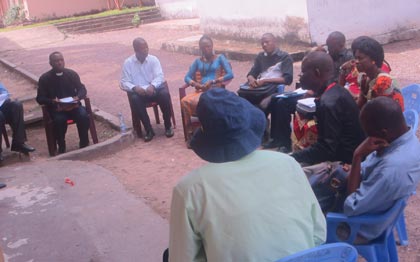Albert Otshudi Longe, a graduate of Africa University, is helping leaders in the Central Congo Episcopal Area understand The United Methodist Church's Social Principles and how they can be lived out at home.
Funded through a Human Relations Day grant, the Social Principles Seminars engage local pastors, church leaders and theology students regarding social injustices and challenges. The workshops identify issues that participants can focus on in their communities and address ways to affect change.
"The project seeks to fill the knowledge gap within the community and develop capable leadership. There exist the will and motivation to do good, but (that's) often limited by expertise and leadership skills (needed to) respond to modern challenges in its complex format," Otshudi said.
 |
"I have seen how systemic injustice has hindered human progress while enriching few people through the exploitation of others. I believe that providing leadership that enables transformative change based on the Christian call for justice is the best contribution I can offer."
Otshudi is current president of the Pan-African Club, a youth-based group engaged in policy development and advocacy on socio-economic and political reforms in Africa.
He said the seminars help make disciples of Jesus Christ for the transformation of the world by reaching people through education, organizing and advocacy.
"The ministry we undertake nurtures people into discipleship where their spirituality acts as the primary motivation for enabling justice in our society, which is transformative and sustainable," he said.
Otshudi points to the West Congo Annual Conference training as a success story. He said the Social Principles training attracted a lot of attention in the area, with leaders there wanting "to explore how to relate the social challenges in their immediate surrounding to the official positions of the church on certain issues."
He said the workshops have led to local churches establishing Church and Society committees to explore issues they can address at a local level.
"Social principle is a light for us United Methodists, because it is guiding us in all the aspects of life. We understand how we can act to create a society where there is peace and justice," said Omakinda Odimba Ado, Church and Society Chair for the West Congo Annual Conference. "Through Social Principles of The United Methodist Church, we understand our role as humans have to play so that we can have a good environment without pollution to avoid diseases such as malaria."
Otshudi said Human Relations Day offerings are providing ministry beyond the short-term.
"(The money) helps develop capacity at local levels to ensure the sustainability of efforts for people, especially young ones to realize their potential. It helps people visualize and take steps to attaining a humane and dignified life as desired by God," he said.
Julie Dwyer, general church content editor, United Methodist Communications
One of six churchwide Special Sundays with offerings of The United Methodist Church, Human Relations Day calls United Methodists to recognize the right of all God's children in realizing their potential as human beings in relationship with one another. The special offering benefits neighborhood ministries through Community Developers, community advocacy through United Methodist Voluntary Services and work with at-risk teens through the Youth Offender Rehabilitation Program.
When you give generously on Human Relations Day, you encourage ordinary people to have a voice in changing the world. Give now.





